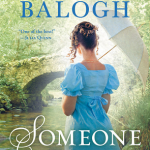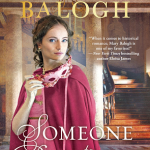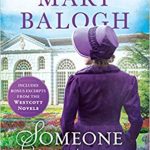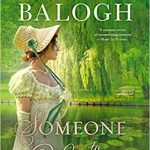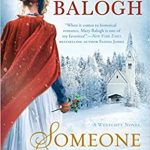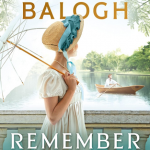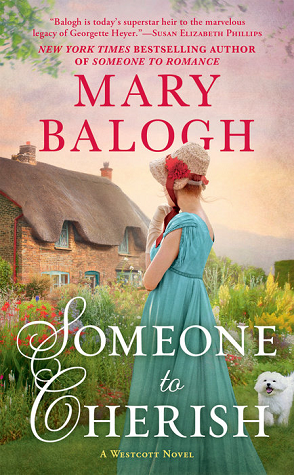 Someone to Cherish (Westcott #8) by Mary Balogh
Someone to Cherish (Westcott #8) by Mary Balogh Format: eARC
Source: supplied by publisher via Edelweiss
Formats available: hardcover, large print, paperback, ebook, audiobook
Genres: historical fiction, historical romance, regency romance
Series: Westcott #8
Pages: 336
Published by Berkley on June 29, 2021
Purchasing Info: Author's Website, Publisher's Website, Amazon, Barnes & Noble, Kobo, Bookshop.org
Goodreads
Is love worth the loss of one's freedom and independence? This is what Mrs. Tavernor must decide in the new novel in the Westcott series from New York Times bestselling author Mary Balogh.
When Harry Westcott lost the title Earl of Riverdale after the discovery of his father's bigamy, he shipped off to fight in the Napoleonic Wars, where he was near-fatally wounded. After a harrowing recovery, the once cheery, light-hearted boy has become a reclusive, somber man. Though Harry insists he enjoys the solitude, he does wonder sometimes if he is lonely.
Lydia Tavernor, recently widowed, dreams of taking a lover. Her marriage to Reverend Isaiah Tavernor was one of service and obedience, and she has secretly enjoyed her freedom since his death. She doesn't want to shackle herself to another man in marriage, but sometimes, she wonders if she is lonely.
Both are unwilling to face the truth until they find themselves alone together one night, and Lydia surprises even herself with a simple question: "Are you ever lonely?" Harry's answer leads them down a path neither could ever have imagined...
My Review:
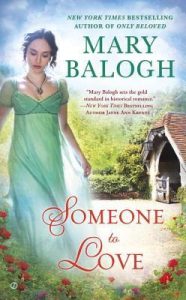 There should be a truly hot place in hell for the late, unlamented Humphrey Westcott, Earl of Riverdale. But, and it is now a huge, 8 marvelous books and counting BUT, the results of his metaphorical bastardy, to whit, the legal and actual bastardy he inflicted on his three children who believed they were legitimate, have been glorious.
There should be a truly hot place in hell for the late, unlamented Humphrey Westcott, Earl of Riverdale. But, and it is now a huge, 8 marvelous books and counting BUT, the results of his metaphorical bastardy, to whit, the legal and actual bastardy he inflicted on his three children who believed they were legitimate, have been glorious.
So maybe an exceptionally hot place in hell with a few occasional luxuries. Because it’s all his fault, including some of the surprisingly good things. Like this series which began with Someone to Love and doesn’t seem to be over yet.
Thank goodness. Or perhaps I should be thanking Humphrey’s badness. Maybe a bit of both?
As big of a factor as Humphrey’s badness has been in this entire series, a more fitting summation of the issues in this entry might be this particular paraphrase of Thoreau, the one that goes, “If you see someone coming towards you with the obvious intent of doing you good – run like hell.” with the added codicil that it goes double if that someone – or many someones in the case of Major Harry Westcott, are family.
There are an awful lot of well-meaning, good intentioned families in fiction who have, let’s call them, boundary issues. As in entirely too many of them ignore any boundaries set by other members of the family. They’re just sure they know best. And maybe, sometimes, they do. But even when they might, even if they do, they can be a bit much and more than a bit annoying and extremely frustrating when the boundaries they are riding roughshod over belong to adults who might, equally and with much better justification, know what they do and don’t want for themselves.
The story in Someone to Cherish centers around two people, both adults nearing 30, so really, really actual adults mostly adulting, whose families are both firmly convinced that neither of these adults could possibly know what they want for themselves, or really mean anything they say about what they want for themselves, and that other people in the family, older if not wiser, know best.
Ironically, or paradoxically, it’s the women of the Westcott family who are certain that Harry doesn’t know what’s good for him, while it’s the men of Lydia Winterbourne Tavernor’s family who are just as certain that she can’t possibly know her own mind or truly desire her own independence.
But there’s a critical difference. When Harry’s family invades his country home to give him a huge 30th birthday party whether he wants one or not, he goes along with their plans because he loves them, because they are already there, and because it would be horribly rude not to. However, that they brought along three young ladies as possible brides for him, all he has to be is polite. No more, no less. His family can’t make him marry or even make him consider one of those young ladies as a possible bride. Even with all of his wealth and titles stripped from him by his illegitimacy, as a man he is still free to live his life as he pleases.
Lydia’s experience is completely the opposite. During her girlhood, her father and brothers did their best to wrap her in cotton wool and protect her from everything she might worry her little head about. Her father refused to allow her a season because London “wasn’t safe” and she wouldn’t be properly protected from the rakehells of the ton. When she married, she went straight from her father’s loving but demeaning protection to her husband’s dictatorial pronouncements about every single facet of her life. As a woman, she has no recourse, the men in her life, who actually do love her, control her very being and expect her to acquiesce. It’s only as a widow with enough money to support herself that she has the freedom to be who and what she wants to be.
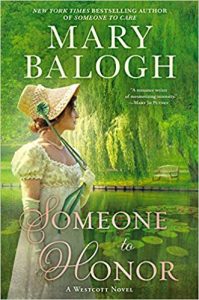 A freedom that she will lose if she trusts herself to another man – no matter how much that man claims to love her. After growing up in an environment designed to keep her childlike, and marrying a man she loved but who dictated her every move and thought, the first person whose judgement she questions is always herself.
A freedom that she will lose if she trusts herself to another man – no matter how much that man claims to love her. After growing up in an environment designed to keep her childlike, and marrying a man she loved but who dictated her every move and thought, the first person whose judgement she questions is always herself.
And yes, this is a personal soapbox that I’ve climbed on and now can’t quite figure out how to get down from. Pardon me a moment while I search for a very tall metaphorical ladder to use for a descent.
All of that being said – and yes, I know I said a LOT – what eventually becomes the romance between Harry and Lydia is very much of a slow burn kind of romance, because they are both slowly burning kind of people. Both have experienced tragedy, both have hidden their true selves behind masks that they are having a difficult time pulling off, and both are very uncertain about trust.
They are also both prominent people in the tiny village of Hinsford, a circumstance that comes to bite both of them in the ass – but also forces them to decide who they are and who they want to be.
It takes them more than a bit of time to figure out that what they want to be is together, because together they have that trust that both of them have lacked.
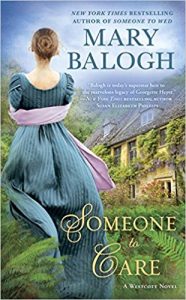 Escape Rating B: This one turned out to be kind of a mixed bag for me as a reader. I got up on that really tall soapbox because there were a lot of elements of the setup that obviously drove me utterly bananas. It has felt like every other book that I’ve read in the last couple of months has been chock-full of families with boundary issues and generally heroines who have trouble saying “NO” and setting and maintaining boundaries with their well-meaning but annoyingly intrusive families.
Escape Rating B: This one turned out to be kind of a mixed bag for me as a reader. I got up on that really tall soapbox because there were a lot of elements of the setup that obviously drove me utterly bananas. It has felt like every other book that I’ve read in the last couple of months has been chock-full of families with boundary issues and generally heroines who have trouble saying “NO” and setting and maintaining boundaries with their well-meaning but annoyingly intrusive families.
The power dynamics of Lydia’s relationship with her birth family AND her late husband add fuel to that fire, as she has no agency until she becomes a widow – and even then her birth family is eager, insistent and downright smothering in their attempts to snatch that agency away from her.
I see that soapbox looming again so I’ll move on.
Lydia has been self-effacing to the point of disappearing in plain sight for most of her life. A huge and lovely part of this story is watching her stretch, grow, and STOP HIDING. Her two steps forward, half step back progress feels real.
At the same time, one of her first steps forward is to ask Harry, in an extremely roundabout and circuitous way, if he’d be interested in starting what we would call a “friends with benefits” relationship. With her.
And every single thing that both of them expect, along with a passion that neither of them knew to expect, happens. Especially all the bad things. It’s their response to those bad things that forms the heart of the romance in this story, but it takes a bit too much of the book to get off the ground – even though they’ve already gotten off. So to speak.
Ahem.
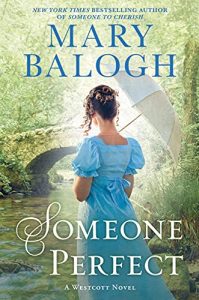 So as much as I’ve enjoyed this series as a whole, the book in the series that this one most reminds me of is Someone to Care, the story I liked the least so far. In that one, the first half was lovely and the second half drove me bananas. With this one its the other way around. The first half was a slog but the second half worked itself out into a lovely HEA.
So as much as I’ve enjoyed this series as a whole, the book in the series that this one most reminds me of is Someone to Care, the story I liked the least so far. In that one, the first half was lovely and the second half drove me bananas. With this one its the other way around. The first half was a slog but the second half worked itself out into a lovely HEA.
I’m glad I read this, both to see how the rest of Harry’s large and boisterous family are doing and to see one of the original “victims” of Humphrey’s bastardy finally get his own life fully together and happy.
I’m still fascinated with the Westcott family, so I’m already looking forward to the next book in the series, Someone Perfect – we’ll see about that! – coming just in time for the holiday season.









